Retirees and workers protests continue in Iran
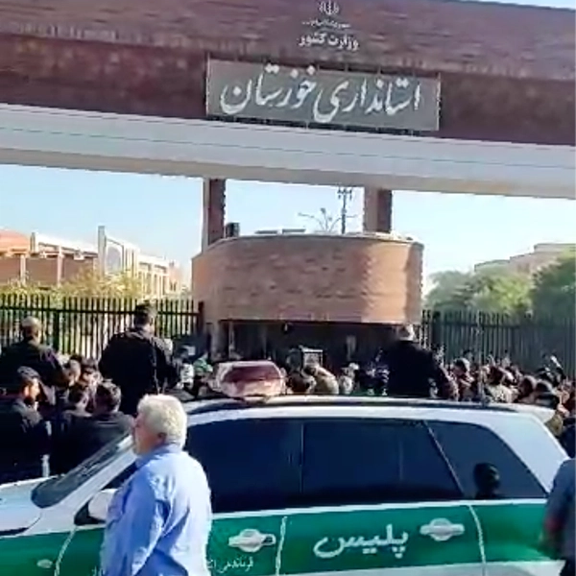
Retirees and workers staged protests on Sunday across multiple cities in Iran, raising concerns over pensions and unpaid wages.

Retirees and workers staged protests on Sunday across multiple cities in Iran, raising concerns over pensions and unpaid wages.
In Kermanshah, retirees from the Social Security Organization (SSO), a social insurance organization in Iran, along with civil service, telecommunications, and education sectors, gathered outside the Department of Cooperatives, Labor, and Social Welfare. They demanded higher pensions to address rising inflation and living costs.
In Ahvaz, steelworkers marched outside the governor's office and municipality, protesting delayed salaries and alleged mismanagement in their workplaces.
In Isfahan, central Iran, steel industry retirees also staged protests, urging authorities to address their demands for overdue payments and improved working conditions.
Labor protests in Iran, fueled by economic hardship, are taking on a more political dimension, with some protesters accusing the government of neglecting domestic economic problems in favor of supporting Tehran-backed armed groups abroad.
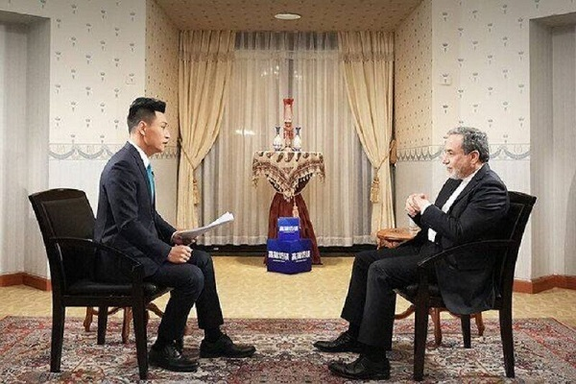
Iranian Foreign Minister Abbas Araghchi has said that diplomacy and battlefield strategies must align as Tehran seeks to maintain its military power despite significant regional setbacks.
“Diplomacy moves in tandem with the battlefield, complementing each other,” Araghchi said. “The battlefield paves the way for diplomacy, and diplomacy turns the achievements of the battlefield into national security, national interests, national pride, and national dignity.”
Referring to Iran’s approach as the “diplomacy of resistance,” he insisted that military and diplomatic efforts must move forward together to secure the country’s objectives.
Araqchi, without mentioning the developments in Syria and the fall of Bashar al-Assad, said: "The enemies think that if they inflict damage on the Axis of Resistance, it will be a victory for them. They must know that this marks the beginning of their defeat."
According to Iran’s Foreign Minister, "What has transpired over the past few months for the region, the Resistance, and Iran was a renewed manifestation of the complete coordination between the field and diplomacy."
The Islamic Republic’s officials’ reference to the battlefield and the Axis of Resistance pertains to the presence of Iran’s proxy forces in Iraq, Syria, Lebanon, and Yemen.
Araghchi expanded on these themes during his recent interview with China’s state-run CCTV, aired Saturday. Addressing the prospect of further Israeli strikes on Iranian targets, he struck a defiant tone.
“We are fully prepared for the possibility of further Israeli attacks,” he said. “I hope Israel will refrain from taking such reckless action, as it could lead to a large-scale war.”
Amid speculation that Israel may escalate its response to ballistic missile and drone attacks by Iran's allies, Araghchi cautioned against the potential consequences of such actions. However, he underscored Iran’s preference for diplomacy, highlighting the importance of reason in preventing conflict. “We believe that reason will ultimately prevail and prevent actions that could have serious consequences,” he told the broadcaster.
The interview, conducted during Araghchi’s late-December visit to Beijing, also highlighted Iran’s efforts to strengthen ties with China. Araghchi discussed regional security and the nuclear deal, reaffirming Tehran’s interest in fostering international alliances to counter US sanctions and Israeli military actions.
Araghchi’s remarks come amid increasing geopolitical and economic pressures on Iran. Israeli airstrikes have repeatedly targeted Iranian-backed forces in Syria, while ballistic missile and drone attacks by Yemen’s Houthi rebels—armed by Tehran—have added to regional instability.
At the same time, Iran faces internal criticism over its setbacks in Syria and the broader region.
It seems Iran’s rhetoric of resistance aims to project strength even as its regional position has weakened. By tying military successes to diplomatic gains, Tehran seeks to sustain its influence in Syria and counter perceptions of weakness.
Araghchi’s remarks also reflect Iran’s broader narrative of perseverance. Whether through alliances with powers like China or the fusion of battlefield and diplomatic strategies, Tehran appears determined to adapt to shifting regional dynamics without conceding defeat.
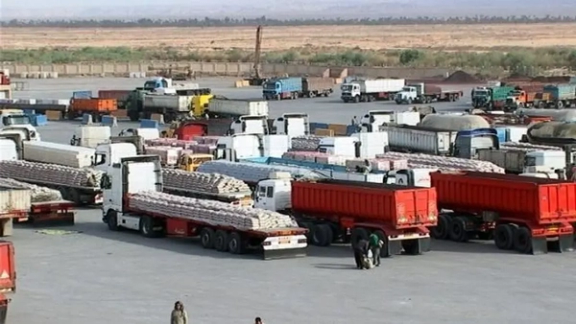
A trade dispute between Iran and Turkey has escalated, with both nations imposing retaliatory measures over fuel taxes on trucks. The tensions come amid Turkey's recent strategic gains in Syria and a decline in Iran's regional influence.
Turkey’s decision to revoke fuel tax exemptions for Iranian vehicles, effective December 29, has left hundreds of Iranian trucks stranded at border crossings, sparking outcry among drivers and escalating tensions between the two regional powers.
Turkey recently introduced a policy requiring Iranian trucks to pay a fuel tax equivalent to 155% of its special consumption tax. The Turkish newspaper Cumhuriyet reported that the tax “applies to all commercial vehicles with Iranian license plates, excluding buses.”
Hundreds of Iranian trucks cross into Turkey on weekly basis as their main transit route to European countries.
Turkish officials argue that the measure is a response to Iran’s Full Tank Plan, which mandates foreign trucks transiting Iran to pay a fuel surcharge for using Iran's extremely cheap diesel. Fuel in Iran is almost 20-fold cheaper than in other regional countries, because the government subsidizes gasoline and diesel. In addition to the subsidized fuel, Iran's rial has dropped to historic lows against foreign currencies, making fuel even cheaper for Turkish truckers.
Now, Iran has retaliated by halting fuel supplies to Turkish trucks as of January 3. The move has caused widespread disruptions, with Turkish drivers protesting what they see as unjust penalties.
Iranian truck drivers are also affected. Drivers report paying penalties of up to 27 liras per liter of diesel under Turkey’s new regulations.
One Iranian driver told Iran International that he earned 1.7 billion rials (over $2100) for transporting a load across Turkey, but incurred 2.7 billion rials (around $3400) in costs due to the new Turkish tax.
Economic and geopolitical implications
The trade dispute is compounded by the broader geopolitical rivalry between the two nations. Despite ambitious goals to increase annual bilateral trade to $30 billion, trade volume has remained at around $7.5–10 billion, reflecting persistent tensions.
These economic pressures mirror political divisions. Turkey's support for Syrian opposition groups and its backing of efforts to oust Bashar al-Assad stand in stark contrast to Iran’s investments in propping up Assad’s government. Recent Turkish gains in northern Syria have drawn criticism from Iran, with Supreme Leader Ali Khamenei accusing unnamed neighbors of pursuing territorial ambitions in the region.
This trade dispute is not an isolated event but part of a broader pattern of actions perceived as hostile to Iranian trade. Turkey’s ally Azerbaijan recently blocked Iranian trucks from transiting through a key route, further restricting Iran’s access to European markets.
The escalating conflict has disrupted vital trade networks and exacerbated economic challenges for both nations. Without resolution, the row could deepen political and economic divides, setting a concerning precedent for regional trade and stability.
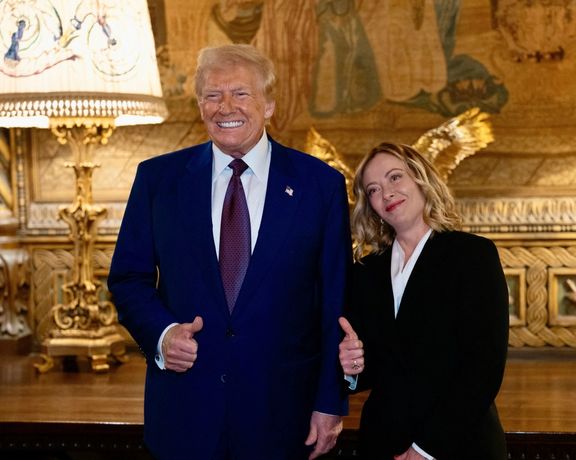
Italian Prime Minister Giorgia Meloni raised the case of detained Italian journalist Cecilia Sala during a meeting with President-elect Donald Trump at his Mar-a-Lago resort in Florida on Saturday, Italian media reported.
The New York Times reported that one person briefed on the meeting said Meloni had pressed aggressively for it.
While details of their talks were not officially disclosed, Meloni reportedly sought Trump's support on the issue, alongside discussions on Russia's war in Ukraine, trade, and the Middle East.
Newspaper journalist and podcaster Cecilia Sala, 29, was arrested on unspecified charges last month and placed in solitary confinement despite working in the country on a valid press pass.
Tehran made clear to Rome that the freedom of an Italian reporter detained in Iran depends on Italy's release of an Iranian arrested at Washington's behest, a source familiar with discussions between the journalist's family and the Italian government told Iran International.
Mohammad Abedini Najafabadi, 38, was arrested by Italian authorities at the behest of the United States for his alleged role in providing technology used to kill three US soldiers in a drone attack in Jordan.
Iran, the source said, is prepared to free Sala “on humanitarian grounds" if the Italian government drops the extradition proceedings against Abedini and grants his release from Milan's brooding La Opera prison.
The Italian foreign ministry has demand Sala's “immediate release ... (and) full assurances regarding her conditions of detention.”
Sala told her family in New Year’s Day calls that her prescription glasses had been confiscated, her cell is barely longer than her own height and that she is forced to sleep on a blanket spread on the floor, according to Italian media.
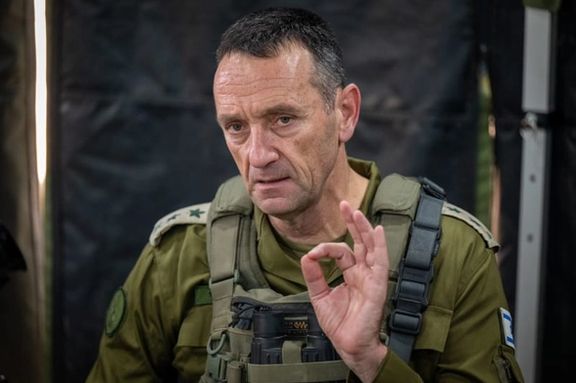
The Israeli military is on high alert following a directive from IDF Chief of Staff Herzi Halevi, amid fears Iran may take extreme actions against the Jewish state, Israeli news outlet Walla reported.
Security officials warn that changes in the regional strategic situation could push Iran to act against Israel.
Along with the decline in the rial exchange rate and internal protests, Walla wrote that the Revolutionary Guards are transferring funds to Hezbollah via civilian aircraft, leading to the Chief of Staff ordering heightened vigilance.
Israel and Hezbollah in Lebanon are in the midst of a 60-day ceasefire but both sides have reported dozens of breaches amid the US-brokered truce.
The report's sources also highlighted uncertainty over Iran's stance ahead of Donald Trump's return to the White House later this month.
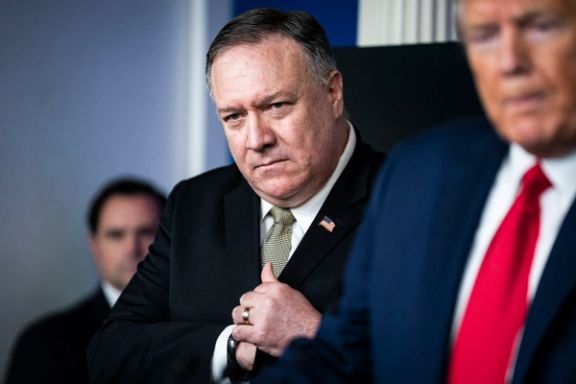
Donald Trump's former secretary of state says the Iranian people should know that the US president-elect recognizes the evil of the Islamic Republic.
"The Iranian people have always been the first victims of the Ayatollahs. But the Iranian people should know that on Jan. 20, we'll have a president that recognizes the evil of Iranian regime," Mike Pompeo tweeted on Saturday, referring to a report about Iran's execution of over 1,000 people in 2024, the highest total in 30 years.